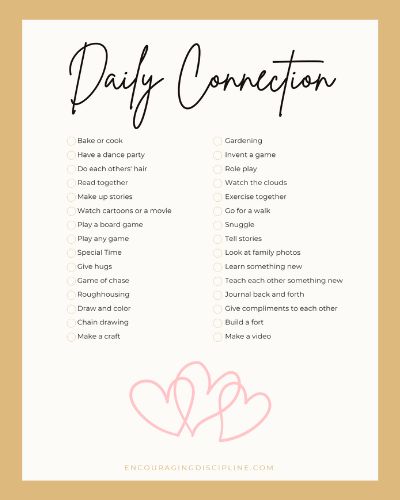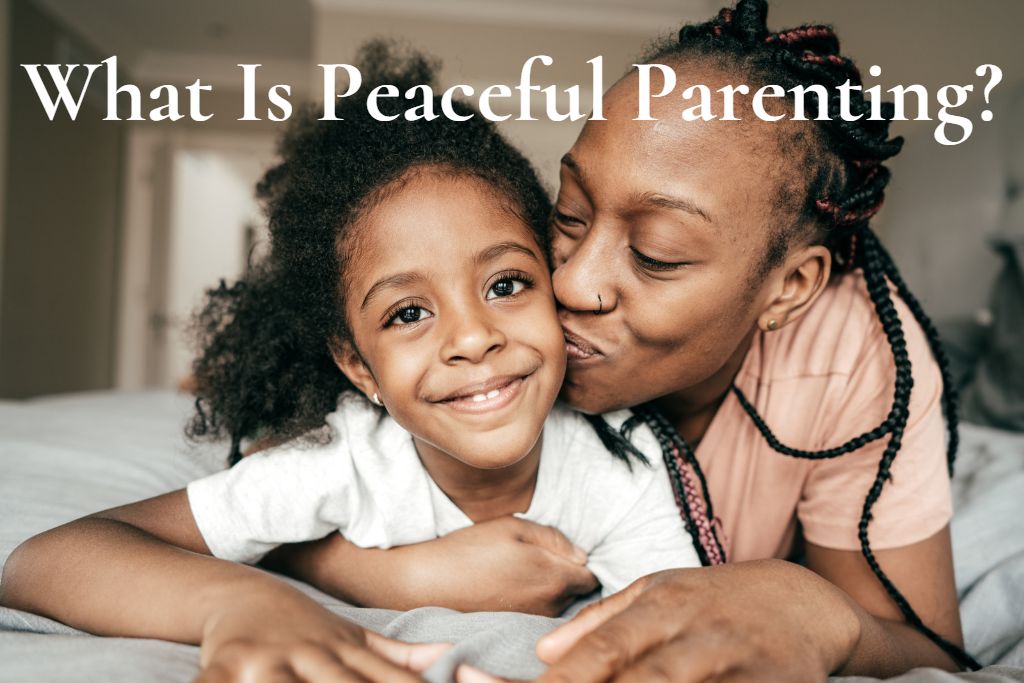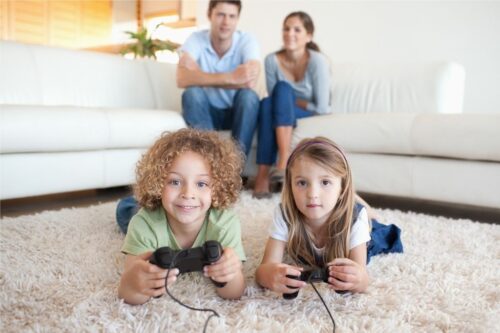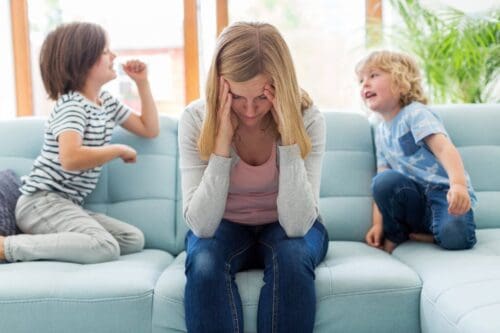What Is Peaceful Parenting?
Peaceful Parenting is a research-based parenting approach developed by Dr. Laura Markham, clinical psychologist and author of the bestselling books Peaceful Parent, Happy Kids, Peaceful Parent, Happy Siblings, and Peaceful Parent, Happy Kids Workbook. She is also the founder of the worldwide popular website Aha! Parenting, with a plethora of articles on discipline and parenting issues.
Table of Contents
The Goal of Peaceful Parenting
The goal of Peaceful Parenting is to create a more peaceful home in which happy, responsible, and considerate children can thrive.
Before you begin feeling the pressure of having to create a home where everyone is always smiling, happy, and consistently doing the right thing, allow me to relieve the burden.
Creating a peaceful home does not mean there will never be any conflict, your children will always obey, and you will never get angry.
What it means is that we have a good understanding of how to raise our children, we know how to navigate difficulties with confidence, repair our relationships effectively, and we feel good about ourselves as parents and humans.
Being a peaceful parent means that when we fail, we show ourselves self-compassion, we get up and try again, and we show up with empathy for our children.
The Three Big Ideas of Peaceful Parenting
At the core of Peaceful Parenting are three big ideas:
Regulating our own emotions
When we develop emotional self-regulation, we heal our triggers and emotional wounds, model healthy expressions of emotions, are more open for connection, and are able to parent with love and wisdom.
Connecting with our children
We build connection with our children through laughter, enjoyment, and being there for them when they are having a hard time. When our connection is strong, so is our relationship with our children.
Coaching instead of controlling
When we coach our children, we step into a leadership role. We model for and guide our children as they learn life skills and healthy relationships. We have clear expectations and offer support to help our children meet them.
What Are Some Tools for Peaceful Parenting?
Tools for Self-Regulation
When we’re angry, we have a hard time connecting and coaching, so this is the first step in any interaction that we have with our kids.
In order for us to access and act from a place of love for our children, we have to take care of our own emotional health first. When we can manage our own emotions, we can also manage our reactions. Only then we can parent effectively.
We regulate our own emotions by:
- taking care of ourselves physically
- healing our triggers and unpacking our emotional baggage so we don’t dump it on our kids
- using self-compassion
- getting support
- using calming techniques, like Stop, drop, and breathe
Tools for Connection
When our children feel connected to us, they also feel that we are there for them, they are unconditionally loved, and they are good enough.
Having a strong connection with our children is the only way they will accept our influence and guidance. And when children are more cooperative, parenting feels easier.
Connection tools:
- Empathy 24/7
- Special Time
- Roughhousing and laughter
- Connect before you correct
- Time-In
Tools for Coaching
In conventional parenting, we are taught to control children by using rewards, punishments (also known as consequences), threats, and time-outs. Controlling creates resistance instead of cooperation, damages the child’s self-esteem, and hurts our relationship.
Coaching is giving our kids support so they can meet our expectations. When we coach, we show our kids that we want them to succeed. We are on their side.
Coaching tools:
- Empathic limits
- Set up the environment
- Emotion-coach
Peaceful Parenting teaches us to guide our children with love and respect, and without punishments and threats.
What Are the Benefits of Peaceful Parenting?
Peaceful Parenting is not your quick-fix, shortcut-type of parenting style. It takes a long-term commitment to work on ourselves and our relationship with our children.
Peaceful Parenting is hard. Especially in the beginning. And it requires a big investment from you, the parent. But it gets easier with time and it is worth it!
With time, you will notice that:
- Your kids will be more cooperative.
- Power struggles will happen more rarely and will end more quickly.
- Your kids will learn to resolve conflicts on their own or with little help.
- You will feel more relaxed and will trust that your child does the right thing even when you’re not around.
- Your child will trust you with their worries and will ask for your advice.
- You and your children will have a warm and close relationship.
Isn’t Peaceful Parenting Permissive?
This is probably the biggest misconception about Peaceful Parenting.
People think that if we show kindness to our children, then we must not have any rules and expectations and we let them run all over us and get away with anything.
This belief comes from the fact that people are not familiar with the tools of Peaceful Parenting.
Learn Peaceful Parenting Tools
If the fear of being permissive has been keeping you from trying to parent peacefully, then remember this:
It’s important that when we take away a set of tools, we replace them with something new.
If rewards, bribes, threats, and punishments are the tools that you’ve been using until now and you want to stop using them, then you have to replace them with something new. So taking time to learn new parenting tools is a must.
Have Clear Expectations
In Peaceful Parenting, we have clear expectations and we make sure that our children meet them. That means that we communicate our expectations and we offer our children the support that they need to successfully meet them.
It also means that we follow through. This isn’t easy when our children whine, nag, or even throw a tantrum, especially if we’re tired or overwhelmed. But we have the tools to support ourselves and our children through tough moments. Consistency is key.
How Can You Begin With Peaceful Parenting?
So now that you’re a little familiar with Peaceful Parenting, where do you begin?
Step 1. Begin with yourself
Creating a peaceful home means we have to start with ourselves. It means that we put our children first by working on ourselves first.
Peace is an inside job. You make the weather in your home.
Dr. Laura Markham
The first thing you can do is practice stopping yourself before having a reaction that you may regret later. Then, take a deep breath. Deep breathing has been backed by research as a powerful tool for slowing down and bringing calm. Finally, use two powerful tools: empathy and self-compassion.
EMPATHY sounds like this: My child is having a hard time, not giving me a hard time.
SELF-COMPASSION sounds like this: I am having a hard time.
You will notice that in these two statements, no one is to blame. We are noticing and acknowledging what is happening. From this new perspective, we can take active steps to remedy the situation.
Step 2. Increase connection with your child
Begin by setting aside a few minutes every day to connect deeply with your child. You can use this time for Special Time, active listening, playing or roughhousing, or just watching them play and being present with them.
Connection doesn’t have to be something complicated. It means delighting in our children more often and letting them see that.
To get started, you can download this list of simple ideas that you can easily do with your kids anytime. You will see that you can sprinkle connection throughout your day with little effort.

Step 3. Set limits with empathy
Try to show understanding and empathy for your child when you set a limit, transition them to a new activity, or when you see them having a hard time in general. When children see that we care, they are more likely to follow our lead.
You show understanding and empathy by noticing what your child is doing. “Wow, you spent a lot of time on this project and it’s got so many intricate details!” or “I know you really want to finish what you are doing.” Then follow with the limit or expectation.
Taking that extra minute to show interest in what your child is doing or feeling will pay off.
Bottom Line
Being a peaceful parent doesn’t mean that we never get angry or that we never have conflict in our home. But it does mean that we are aware of how we show up in our parenting, we assess the quality of our relationships with our children, repair any ruptures, and make our relationship with our children a priority.
If parenting feels really hard and you are unsure of how to change the dynamic in your family, please consider getting help. I offer parent coaching to support you in your journey to becoming the parent you want to be.
Parenting is the most challenging job we will ever do in our lifetime. It is not meant to be dealt with alone. Whether it’s through parent coaching, therapy, family, or friends, make sure you have a supportive tribe to cheer you on and offer you compassionate guidance on this incredible journey.







